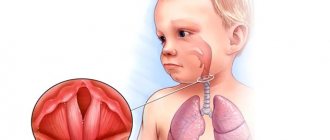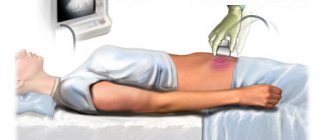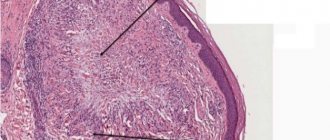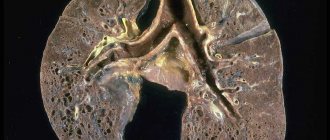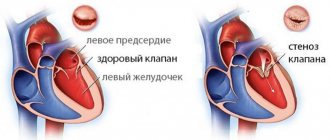Children are sometimes diagnosed with a specific disorder of the autism spectrum. It is characterized by the complexity of social interaction, certain communication disorders, and a unique range of interests. This pathology is called Asperger's syndrome. Doctors make such a diagnosis only after in-depth clinical and then neurological and psychiatric examination.
According to the ICD-10 classification, pathology has a separate category. ICD-11 identifies it as a mental development disorder, similar to autism. Some American experts propose banning this diagnosis altogether, changing it to the definition of “childhood autism spectrum disorder,” adding to it the severity of the disease.
Causes of Asperger's Syndrome
Asperger's syndrome is a congenital developmental disorder, a form of autism.
The disorder affects a person's perceptions and behavior when interacting with other people. With this disease, it is difficult for a person to understand facial expressions, intonation, postures, gestures, and this affects interaction with other people, as well as the expression of emotions. This can manifest itself in different ways: sometimes people with Asperger's syndrome appear normal, but still have difficulty communicating. Asperger's syndrome is more common in men than in women (by some estimates, 8 times more common). It can occur in both children and adults. It is usually identified when the child goes to kindergarten or school and the first communication problems arise.
The exact causes of the disease have not been established. It is known to be associated with genetic disorders, but the mechanism of inheritance has not been determined. Asperger syndrome is much less common in women than in men, and this, among other things, confirms the genetic nature of the disorder. They also consider the influence of immunological and environmental factors, determine which of them during pregnancy can influence the mother’s body in such a way that it causes disturbances in the development of the child, but so far the exact patterns have not been identified. In addition, scientists are studying the connection between autism spectrum disorders and the influence of social factors, using assisted reproductive technologies, but the accumulated data is not enough to draw reliable conclusions.
Figure 1. Symptoms of Asperger's syndrome. Source: Verywell Health
Dietary supplements inexpensively
Asperger's syndrome can be considered one of the most poorly understood conditions. When it was first studied, it was placed in the category of psychopathy because individuals with this disorder exhibited significant deficits in the ability to empathize, communicate, and other characteristics associated with psychopathic individuals. But further study of this condition “rehabilitated” it, and now psychologists prefer to classify it as an autism spectrum disorder.
Free consultation right now!
Online consultation with a specialist on your issue!
License number: LO-77-01-019036
True, for those who are forced to come into contact with a person suffering from this disorder, or for the “owners” of Asperger syndrome themselves, the name means nothing. They want to know how to live with this condition and whether there is a chance of becoming a full-fledged member of society.
Symptoms of Asperger's Syndrome
Asperger syndrome manifests itself differently in different people, usually as a combination of several symptoms.
There are several main signs¹:
- Difficulties with nonverbal communication, for example, when speaking, it is difficult to look your interlocutor in the eyes, understand facial expressions or gestures, and intonation.
- Problems in relationships with other people: it is difficult to start communicating, maintain contact, and make friends. Even when people with Asperger's syndrome want to socialize, make friends, and maintain friendships, they find it difficult to do so.
- Inability to communicate emotionally due to problems recognizing other people's emotions.
- Experiences, hobbies, events in the lives of other people do not arouse interest.
- There is a tendency to constantly repeat patterned or limited actions, such as following a certain order of actions (even if there is no practical sense in it) or performing monotonous movements (rocking back and forth, tapping fingers).
- Tendency to constant planning, strict organization, attention to detail.
- Monotonous, unemotional, devoid of intonation speech.
- Strange posture or movements, awkwardness, clumsiness, poor coordination of movements.
- Difficulties in understanding figurative speech, abstract ideas, generalizations, but at the same time good perception of clear, structured information that allows only one interpretation.
- Having sensory sensitivities—certain sensations (bright lights, loud noises, rough fabrics, touch) can be very uncomfortable.
- A high level of anxiety, which in adults can even provoke panic attacks.
The disease does not always have all these symptoms. Disorders can manifest themselves in different ways and affect a person's life and relationships with other people to varying degrees.
Good and bad days
Manifestations of the disease do not always have the same effect on well-being and behavior. Sometimes there may be “good” days when it is possible to avoid irritants associated with sensory sensitivity, and then the state of health remains normal. On “bad” days, due to sensory sensitivity, disruption of plans, or other reasons, anxiety and tension may increase, and this can lead to a breakdown. To ensure that breakdowns occur as rarely as possible, it is important to create a comfortable environment around the child or adult, and to take into account restrictions that are important to him (for example, the need to strictly adhere to a daily routine or avoid large crowds of people).
Signs of Asperger's syndrome in adults
Symptoms associated with Asperger's syndrome can last a lifetime. In adults, several signs may indicate the presence of the disease:
- A specific manner of speech. Sometimes this is an unusual voice timbre or lack of intonation. Often there are almost no pauses in speech; it is more like a monologue, during which the interlocutor is hardly listened to and a lot of facts are told to him.
- Poor facial expressions and gestures. The reason is problems with nonverbal communication.
- Unusual eye contact. During a conversation, a person with Asperger's syndrome simply does not need to look into the eyes of the interlocutor, but if you draw his attention to this, he, on the contrary, may begin to look too closely.
- Problems with empathy. Due to their perceptual characteristics, these people have difficulty understanding others' emotions and therefore seem unable to show empathy or empathy.
- Incorrect behavior. The disease makes it difficult to interpret the reactions of others and intuitively structure one’s behavior correctly. This may make the behavior seem rude, distant, or ill-mannered.
- Concentration on one topic or subject. This can manifest itself in a conversation when a person begins to talk at length and in detail about what he is passionate about, shows an obsessive interest in something, talks non-stop on the same topic, without noticing that other interlocutors are uninterested or uncomfortable.
- The desire to plan. With this violation, it is important to follow a certain order in everything or follow certain rules. Any changes can cause discomfort, anxiety and even panic.
- Manifestations of sensory sensitivity. Due to altered perception, sounds, light, and tactile sensations can cause discomfort. It is described as if the world becomes several times louder, brighter, noisier. This perception influences behavior: a person avoids hugs and touches or tries to avoid being in places that are too noisy.
How can I tell if I have Asperger's syndrome?
Below is a list of statements characteristic of this disease:
- It is difficult for me to understand how others feel and what they are thinking.
- I find it difficult to interact with other people or groups of people.
- It’s hard for me to carry on small talk, to maintain conversations on abstract topics.
- I often try to shift the conversation to a topic that interests me (even if the other person is not interested in it).
- People often consider me a rude or ill-mannered person.
- I have narrow or unusual interests on which I can focus completely and for long periods of time.
- I pay attention to details and remember facts well.
- I find it difficult to make friends or get to know people.
- I prefer to always act in a certain way and not change the order of actions at all.
Signs
Signs of Asperger's syndrome include:
- Difficulties in mutual communication in society - inability to interact with peers, behavior inappropriate to what is happening.
- Narrowness and limited interests. A craving for collecting, an obsession with one thing.
- The need for consistency in routine , activities, hobbies, love for order and ritual actions.
- Speech and language problems - monotonous or overly formal speech, literal perception of meaning, verbosity, sudden changes in the topic of conversation.
- Difficulties with non-verbal communication (misunderstanding of body language, facial expressions, intonation)
- Clumsiness.
An Aspergers teen learns visual information well, but has difficulty perceiving it auditorily . Often ignores generally accepted rules of behavior and breaks them because he does not know how to apply them in a certain situation. Doesn't notice other people's emotions and mood changes. Not capable of making friends. Due to increased sensitivity, he has his own specific preferences in clothing, which may not be popular among his peers, which causes ridicule of himself.
Due to a lack of understanding of what can be said and what cannot be said, and sometimes expressing tactless and inappropriate thoughts out loud, arouses hostility among others. The child becomes an outcast, which leads the Aspergers teen to depression and thoughts of suicide. At the Leto clinic, parents can get specialist advice on how to properly behave with a patient during a difficult period.
Diagnosis of Asperger's syndrome
The first signs of the disease may appear in children at an early age. Parents or a pediatrician may notice them by the age of 2-2.5 years. Often the condition becomes noticeable only after the child starts going to kindergarten or school. Sometimes the disease is diagnosed only in adulthood. The range of symptoms and their severity can vary greatly from person to person. Because of this, problems may arise during diagnosis, and the syndrome itself may remain unrecognized for a long time.
The world for a child with Asperger's syndrome is brighter and louder than for ordinary children. This special perception of reality causes discomfort. Photo: drobotdean / freepik.com
Asperger's syndrome is characterized by several signs, the presence of which makes a diagnosis:
- There are violations of nonverbal communication: for example, problems with interpreting postures, gestures, facial expressions, lack of eye contact when speaking.
- Problems communicating with peers, difficulties maintaining friendships, and communicating with other people.
- There is no spontaneous urge to share joy, achievements, or interests with other people.
- There is a lack of empathy, empathy, emotional or social reciprocity.
- There are stereotypical, constantly repeated actions, activities, behavior algorithms or interests. For example, maintaining an active, narrowly focused interest, the desire to follow a strictly defined routine, make repetitive movements, constant concentration on individual objects or their parts.
Limited interests, repetitive behavior, constant concentration on one thing - all these are symptoms of Asperger's syndrome.
Photo: Poindexter Propellerhead / Wikipedia (CC BY-SA 3.0) At the same time, with this disease there is no speech delay, lag in the development of self-care skills, thinking, adaptation (except for communication with other people). The child grows up inquisitive, his intellect is normally developed, and problems with learning can arise only due to difficulties in communication. Sometimes the disease manifests itself as clumsiness and slight incoordination, but this is not a necessary symptom.
stimming
As with other autism spectrum disorders, with Asperger's syndrome a child or adult may periodically stim - make monotonous rhythmic movements that calm him down, help him cope with anxiety or the influence of an overwhelming sensory environment.
Stimming can manifest itself in different ways: for example, as rocking the body, repeating words, circling in one place, or walking back and forth. Stimming is important - it helps relieve tension, “disconnect” from an irritating factor, and avoid a breakdown. Therefore, it is important not to interfere and, especially, not to scold or shame the child for stimming. In children, several specialists may be involved in diagnosing Asperger syndrome: not only a psychiatrist, but also a psychologist, pediatrician, teacher, speech therapist. Adults should consult a psychiatrist for diagnosis.
People with Asperger's syndrome may have limited or specialized interests, such as building a tower of cans like the boy in the photo. Photo: Andwhatsnext at English Wikipedia (CC BY-SA 3.0)
Therapy
There are no special tests to determine whether there is a problem. When diagnosing, genetic and neurological examinations, intelligence tests, psychomotor tests, interviews with parents and the child are carried out. Many people with this diagnosis are characterized by low muscle tone and poor coordination. There is no single treatment regimen. Actions are aimed at improving the quality of life, teaching speech and communication skills. Neurotherapy is used to develop the brain's ability to self-regulate. The method is dangerous because repeated excessive stimulation can provoke anxiety, agitation, aggression, and panic attacks.
Drug therapy includes the use of:
- drugs that block the reabsorption of serotonin (selective inhibitors - fluoxetine, fluvoxamine, sertraline); -antipsychotics that support communication between nerve cells (risperidone, olanzapine); -stimulants to increase attention, concentration, energy levels.
Treatment for Asperger's Syndrome
There is no cure for Asperger's syndrome yet, but some therapies can relieve symptoms, make it easier to adapt to, and help a person with the disorder interact better with society. To do this, it is important to receive support from the treating psychiatrist and psychologist, learn social skills and communication. If other disorders also develop, the doctor may prescribe medications. These can be antipsychotic, anti-anxiety, sedatives, hypnotics and other drugs. Drug therapy is not the main way to treat the disease. The main way to control its course is psychosocial support².
What can help an adult with Asperger's syndrome?
- Information. It is important to accept your own diagnosis, learn as much as possible about it, and understand exactly how and in what situations it has an impact.
- Independence. You need to gradually develop independent living skills. The desire for planning and control can be used in this.
- Education. By studying the norms of social behavior, training communication and social skills, you can gradually learn to communicate.
- Warning. You can use planning to avoid obviously uncomfortable situations (staying in noisy places, crowds of large numbers of people).
- Career guidance. Narrow interests can become a profession. Often, strong concentration on them, the desire to follow the rules, follow instructions allows you to achieve great success professionally.
If Asperger syndrome is diagnosed in childhood, parental support is of great importance, as is social adaptation. To help a child with this disorder, you need to:
- Maintain a calm and friendly atmosphere in the family. It is especially important for parents to take care of their emotional state. It affects the child, and irritability, tension, and fatigue can increase his anxiety and sensory sensitivity.
- Allow the child to remain an individual. Overprotection will not allow the child’s potential to unfold. It is important that he can gain self-service skills and gain independence. This requires gradual training. You can plan it together with your doctor or teacher.
- Develop strengths. The child may concentrate strongly on certain activities. For example, he may constantly draw or study all about his chosen topic. It is important to support such interests, treat them with respect, and develop them. Any of them can become the basis of a profession in the future.
- Make socialization comfortable. It shouldn't be violent. It is important that the child learns to communicate in the mode that suits him. At the same time, he should know that his parents support him. To do this, you need to calmly and in detail explain the rules of behavior in a team, communication with other children, dialogue, and maintaining friendship. It is difficult for a child with Asperger syndrome to adapt to a group of children, and the help of parents is especially important for him.
- Consider sensory considerations. In this disorder, perception is altered so that any sounds may be very loud, colors or light sources may be too bright, or tactile sensations may be irritating. Parents need to find out what sensory features the child has, and, if possible, limit the effect of those factors that interfere with him, alleviating his condition.
- For Asperger's syndrome, it is especially important to develop personality strengths.
Important! You should not scold or physically punish a child for displaying Asperger's syndrome. If he has a breakdown, it is important to protect him from the action of provoking factors. You need to find ways to help with a breakdown, for example, sometimes proper breathing or just resting in a quiet, safe space helps. If a child stimmits (makes repetitive movements to calm himself or concentrate), there is no need to stop him from doing this.
Treatment at the Leto mental health center
Unfortunately, it has not yet been possible to find a cure or method that would completely eliminate Asperger's disease. Proper treatment in children may result in some reduction in the negative symptoms of the disorder. This will make it easier for the child to function in society. Once a child is diagnosed, complex therapy is most often used. It combines medication and social interaction. Medicines have a calming effect, suppress attacks of aggression, and block the need to perform repetitive actions. The child receives antidepressants and antipsychotics. They are always used only in justified cases and under medical supervision.
In addition, trainings are mandatory, mood control techniques, and options for getting out of a stressful state are studied. In parallel, a number of therapeutic techniques are used:
- social skills training sessions,
- Sensory Integration (SI) classes
- sessions of behavioral and cognitive psychotherapy,
- Special physical exercises that help patients gain control over their movements have a good effect.
Timely detection of Asperger's disease and its comprehensive treatment allow us to hope for a favorable prognosis. Over time, symptoms may even subside. People with this disorder can live happy lives, function every day, and grow in their areas of interest if someone helps them understand themselves and the needs of others.
The most important thing is that parents, loved ones, teachers make the most of the positive aspects and resources of the child, so that they give him the opportunity to contact the world, and not separate him from it. Use the talents and good memory of your baby or teenager. If they become admired and accepted by the group, it will be much easier for him. The work involved in socialization can be long and a little tedious, but it really pays off.
Do you suspect your daughter or son has Asperger's syndrome? Would you like to receive detailed advice on a disease? Do you need to choose a plan for therapy and social adaptation? Just dial 8(969)060-93-93!
Forecast
In 40%³ of children with Asperger's syndrome, its manifestations soften as they grow older, but problems in communication, sensory sensitivity, and the desire to concentrate on an object of interest may persist.
Psychosocial support is very important for a child with Asperger's syndrome. Sessions with a psychologist can alleviate the symptoms of the disease. Photo: photographee.eu / Depositphotos
If symptoms do not improve as the person gets older, the diagnosis is changed to "schizoid personality disorder", but in fact the person continues to suffer from Asperger's syndrome³. Most often, adaptation results are average. The person becomes more or less independent, but he retains a number of personal characteristics associated with the disease. In many cases, all problems associated with communication, behavior and interaction in society persist to a certain extent throughout life. Symptoms may change over time. Against the background of the underlying disease, other disorders or diseases may appear, including alcohol addiction and depression.
With good adaptation, a person with Asperger syndrome can be very successful in their chosen profession, they can start a family, be completely independent and experience almost no noticeable difficulties in social interaction.
History of the study
The disorder was first studied in depth by the Austrian psychiatrist Hans Asperger, which is why it received its name at the suggestion of Lorna Wing from England in 1981. Back in 1944, a pediatrician described sick children who noticed a lack of inclination for non-verbal communication, very limited emotionality when contacting people around them, and a certain awkwardness in physical exercises.
At the end of the last century, diagnostic standards were developed and introduced into psychological practice. Thanks to them, it was possible to identify children with Asperger's syndrome. This disorder began to be considered a mental disorder, since affected children had difficulties with social interaction, they were found to have a stereotypical repertoire of daily activities and a cycle of repetitive interests.
The diagnosis has been officially removed since 2013 from the American edition of the Diagnostic Manual of Mental Disorders. However, in practice the term continues to be used, although the syndrome has quite common criteria with autism, also listed in the group of autistic disorders.


